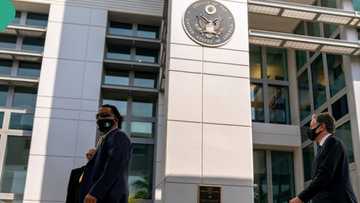“No More $10,000:” Canada Announces Changes to Proof of Funds For Students, Nigerians React
- The Canadian authorities have adjusted the proof of funds for international students wishing to study in the country
- The Canadian government increased the fund by 106.4%, from $10,000 to $20,635 per student
- The directive takes effect from January 1, 2024, as the Canadian government said the new threshold is for students to keep with current realities
Pascal Oparada has over a decade of experience covering Tech, Energy, Stocks, Investments, and Economy.
The Canadian government has increased the cost-of-living Proof of Funds requirement for study permit applicants from other countries, including Nigeria, by 106.4% to $20,635.
The new procedure will apply to new study permit applications received on or after January 1, 2024, a statement by the Immigration Refugees and Citizenship Canada (IRCC) stated on Thursday, November 7, 2023.

Source: Facebook
The new directive is to allow students to cope with life in Canada

Read also
'No more N8m': Japa gets tougher as Canada raises proof of funds for Nigerians, details emerge
Applicants to Canada need to show at least $10,000 in their bank accounts to prove that they can cope with the cost of living in the country.
PAY ATTENTION: Click “See First” under the “Following” tab to see Legit.ng News on your Facebook News Feed!
Marc Miller, Canada’s minister of Immigration, Refugees, and Citizenship, said in a statement that moving forward, the new threshold will be adjusted annually when Statistics Canada updates the low-income cut-off (LICO)
He said LICO is the minimum income required to ensure that individuals do not have to spend a greater-than-average portion of income on necessities.
According to Miller, the cost of living requirement for study permit applicants has stayed the same since the early 2000s, when it was established at $10,000 for a single applicant.
Nigerians account for a large percentage of African students in Canada
Per the statement, for 2024, a single applicant must show they have $20,635, representing 75% of LICO, in addition to their first year of tuition and travel costs.
Miller said the change will apply to new study permit applications received on or after January next year.
BusinessDay reports that data from IRCC shows that India (175,021), Nigeria (43,482), the Philippines (21,902), China (14,975), and Nepal (12,776) were among the top five source countries of new international students coming to Canada in the first six months of 2023.
Reacting to the development, Uchechi Uzoegbu who moved to Alberta in Canada last year said she had always told Nigerian students wishing to come to the country to prepare.
"Life in Canada is not what it used to be. You have seen stories of foreign students living on the streets or living in squalid conditions. This is because they quickly exhausted the funds they came with," Uzoegbu told Legit.ng.
Temitope Adeoye told Legit.ng that the new requirement will put a strain on the finances of most Nigerians, especially the youths wishing to emigrate.

Read also
“We have interviewed more than 115,000 Nigerians”: US embassy reveals as 'Japa' wave hits harder
"When I came it was $10,000 and that was hardly enough because the cost of living kept escalating."
“It Will Help Them”: Canada announces new rule for Nigerians, others coming to study from December 1
Legit.ng reported that the Canadian government has announced that international students, including Nigerians, will have to verify their admission from December 1, 2023.
According to a statement published on Canada's immigration website, Honorable Marc Miller, the Minister of Immigration, Refugees and Citizenship, said the changes to its International Student Program will safeguard authentic students from fraud.
Recently, the Immigration, Refugees, and Citizenship Canada (IRCC) and the Canada Border Services Agency (CBSA) conducted an investigation, revealing that out of the 103 cases reviewed, 63 admissions were confirmed to be genuine students, while 40 were not.
PAY ATTENTION: Donate to Legit Charity on Patreon. Your support matters!
Source: Legit.ng


